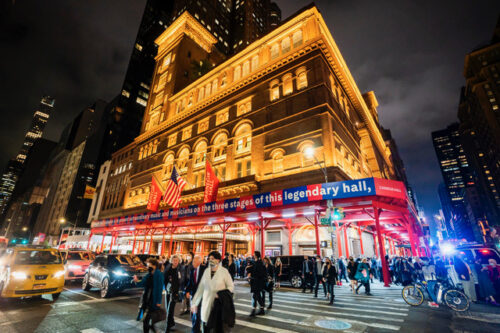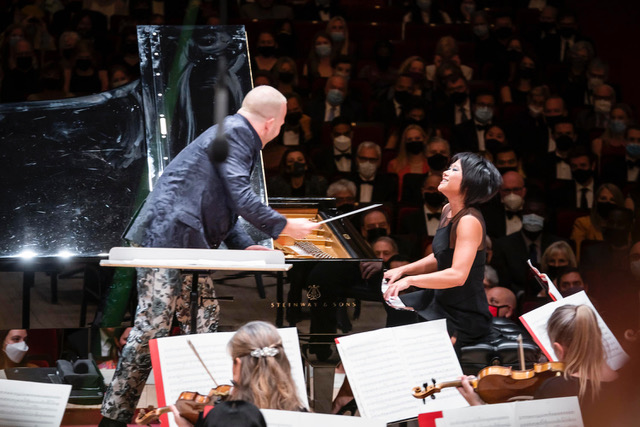 United States Various: Yuja Wang (piano), The Philadelphia Orchestra / Yannick Nézet-Séguin (conductor). Carnegie Hall, New York, 6.10.2021. (RP)
United States Various: Yuja Wang (piano), The Philadelphia Orchestra / Yannick Nézet-Séguin (conductor). Carnegie Hall, New York, 6.10.2021. (RP)

Valerie Coleman – ‘Seven O’Clock Shout’
Shostakovich – Piano Concerto No.2
Bernstein – Overture to Candide
Iman Habibi – ‘Jeder Baum spricht’
Beethoven – Symphony No.5, Op.67
‘We’ve missed you!’ And so Yannick Nézet-Séguin greeted the audience at the sold-out opening night concert of Carnegie Hall’s 2021/22 season. Nézet-Séguin was ebullient, but he stressed that collectively we have been through too much since March 2020 to go back to the way things were, especially when it comes to repertoire. He comforted traditionalists with the assurance that there will always be a place for Beethoven, but indicated that room must be made for new voices writing the music of today.
The program for this gala concert was cast in the spirit of this new beginning but operated on complex emotional and musical levels. Nézet-Séguin programmed three works that will forever be linked to the Philadelphians and the pandemic – Valerie Coleman ’s ‘Seven O’Clock Shout’, Iman Habibi’s ‘Jeder Baum spricht’ and Beethoven’s Fifth. The latter, however, also hearkened back to music that had reverberated in Carnegie Hall just prior to lockdown when Sir John Eliot Gardiner and the Orchestre Révolutionnaire et Romantique performed all of the Beethoven symphonies at the end of February 2020.
Bernstein’s Overture to Candide is trotted out for almost every gala musical event in America. By pairing it with Shostakovich’s Piano Concerto No.2 in the middle of the concert, rather than as a rousing curtain raiser, dots were connected musically, culturally and historically between the two works and their creators working at the height of the Cold War. It was if Nézet-Séguin was proving a point that he had made in his remarks: music can indeed unite us. In this context, the Bernstein seemed just a bit weightier and more consequential, although it is impossible to dim its sparkle and vitality.
Coleman’s ‘Seven O’Clock Shout’, conceived, composed and performed in isolation, pays tribute to the pandemic’s essential workers and to that moment in time when many came together to honor and thank them for their efforts each evening. Coleman envisioned ‘Seven O’Clock Shout’ as a tone poem in the tradition of Debussy’s Prélude à l’après-midi d’un faune. The slow buildup of emotions over an ostinato and shimmering textures may hearken back to French Impressionism, but the traditional African call-and-response style with the orchestra’s shouts answering the solo trombone is pure Coleman.

Glamour, excitement and impeccable musicianship are Yuja Wang’s calling cards, but in the Shostakovich, she also displayed wit and humor. The concerto was written as a birthday gift for the composer’s nineteen-year-old son Maxim, who premiered the work at his graduation from the Moscow Conservatory. (The Philadelphia Orchestra first performed the work in 1982 with Maxim Shostakovich conducting and his son, Dmitri, as soloist.) It is a fun piece that in this performance was lighter than air and captivating from the first note to the last.
Iman Habibi’s ‘Jeder Baum spricht’ was commissioned by The Philadelphia Orchestra as part of its commemoration of the 250th anniversary of Beethoven’s birth in 2020. The work received its premiere in March 2020 at the last concert that the orchestra played before lockdown, in an empty concert hall and streamed on Facebook. Habibi was inspired by words that Beethoven wrote in a sketchbook on one of his walks in the Vienna countryside: ‘Every tree speaks through you!’ – the you being God. In this dark, disturbing piece, Habibi explores how Beethoven might react to the climate change that the world is currently experiencing.
Intended as a dialogue with Beethoven’s Symphonies Nos. 5 and 6, it is an unsettling work. Heavy slabs of sound summoned the power and horror of natural catastrophes, but there were also moments of great beauty, such as the passage that Habibi marked as ‘drowning in sound’ where the woodwinds and lower strings combine to create primeval watery sounds of almost impenetrable depth.
Habibi ends the work on a hopeful note, but there was no time for reflection. With barely a second to breathe, the orchestra played what are perhaps the most famous four notes in music: the opening measures of Beethoven’s Fifth Symphony. It was an uncomfortable moment where the familiar jarred with the unexpected. The symphony’s opening measures have never sounded so ominous.
What followed was a glorious performance of the Fifth. It wasn’t just the sounds of those fabulous Philadelphia strings, to say nothing of its phenomenal woodwinds and brass, but the depth of emotion that Nézet-Séguin and the players instilled in every note. Moreover, the orchestra was having fun. Their smiles, perhaps more than anything, captured what had been missing for 572 days at Carnegie Hall, the human connection that only a live performance affords.
Rick Perdian
